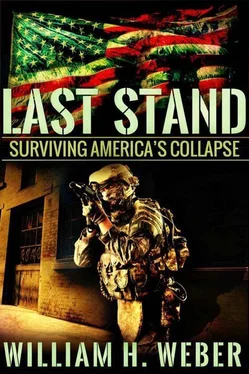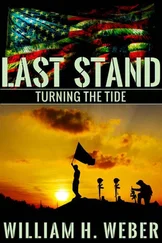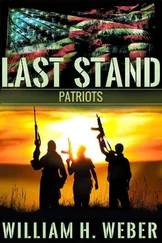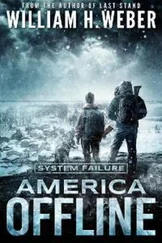Diane looked suddenly grim. “You know the sick and the elderly will probably be the first to go, given the state of things.”
Stark as it was, Diane did have a point. “It’ll be unavoidable unless we can get the medicine we need.”
“You heard Sally Wright, the grocery store shelves were already picked clean,” Al said in despair. “I can only imagine what the pharmacies must look like.”
“That’s where security and liaison come in,” John told them with a sly grin.
Diane threw him a quizzical look.
“One security detachment will be responsible for going out to pharmacies to procure what we need.”
“And what if they’re empty?” Al asked.
But John had an answer for that. “Then the liaison office will use their connections within the surrounding communities to identify who has the meds we need and set up a way to barter for it.”
Diane laughed. “Willow Creek is quickly becoming its own little country.”
“For now,” John said. “I’ll take over security and handpick a half-dozen men and teenage boys that I can deputize. As for the liaison officer, you’re one of the most likeable guys on the block, Al. Maybe that’s a role you could fill.”
Al blushed and clapped John on the back. “With all the time I spent watering my garden, I was sure you woulda made me the groundskeeper.” His belly shook as he rattled off a phlegmy laugh. “I sold fertilizer for forty years, so slinging crap won’t be anything new for me.”
“So that leaves food, water and information,” John said, glancing at his notes.
Diane shook her head. “Here’s the thing. Some of us will have more food than others do. John, I hope you’re not suggesting we put all our food together and have it doled out by the committee.”
“There’s another slippery slope,” Al said, “that’ll lead straight to Communist Russia. People will wonder why they should push themselves when the state provides everything they need.”
The comparison frustrated John. “That’s not what I’m suggesting at all. Food management will keep track of what families have less than a week’s worth of food left. We can then have that family provide items we can use to barter with another community or see if anyone on the street is willing to help them out.”
“What about water?” Diane asked.
“That group will need to set up collection and filtration stations, possibly connected to eavestroughs to gather overflow. Worst-case scenario they’ll need to sort out heading down to the Tennessee River and getting it that way.”
“Any candidates come to mind?” Al said.
“Sure, one comes right to mind for food management. Arnold Payne imported and exported dried fruits and nuts, so he should know something about keeping inventory lists and keeping track of what’s coming and going. As for water, doesn’t Susan Wheeler work for Knoxville sanitation?”
“I believe she did,” Al said. “Guess all that leaves is information.”
“That’s a tricky one. Just like Dan Foster and the mayor’s office, I don’t want anyone who’s ever worked for a newspaper.”
“Really?” Diane said. “Someone like that would be perfect. In fact, Patty Long’s daughter is studying journalism.”
“Which makes her a double whammy,” John shot back. “First off, I don’t want two members of the same family on the committee. Second, someone who’s studying journalism will feel bound by the journalistic principle to inform the people, no matter how damaging that information might be. I know censorship is a touchy subject, but we’re already facing an uphill battle. It won’t help anyone’s morale to hear that the government’s been dissolved or that half the population is dead.”
“Curtis Watkins worked for the Census Bureau,” Al said.
John snapped his fingers and jotted Curtis’ name down. “He’ll be perfect. We want someone who’ll gather and record the information they find without zealously trying to spread the word.”
“At least not until the committee’s voted on it,” Diane said.
Both men nodded and John glanced down at his list again, not sure yet whether this experiment in self-governance would work or end in complete disaster.
Most of the neighborhood was still moving stalled cars into position at both ends of the street and reinforcing the barricade with whatever they could find. John now had a committee list he would present, but before he did he wanted to make sure Emma was all right.
He found her in her bedroom, little more than a mound underneath her blankets. John settled at the end of her bed and nudged her.
Emma’s head came out. Her eyes were ringed with red puffy circles. She sniffled and brought a tissue to her nose.
“Your mother said you wouldn’t talk to anyone.”
“What is there to say?”
“I know it doesn’t look good for Brandon and his family, but I wouldn’t expect the worst just yet.”
Emma sat up and scrunched her hands together. “I can’t help it, Dad, I’m just so worried. His house was ransacked. Mr. Hector and his family were nearly murdered.”
“I know. I spent most of the morning going through both scenes. We searched Brandon’s house top to bottom, honey, and didn’t find a soul. But that isn’t a bad thing. It means we also didn’t find any signs that something bad happened to them.”
“What if they were kidnapped?”
That was a distinct possibility and one that had occurred to John. It was a tactic Somali pirates in the Gulf of Aden often used. Except here, instead of demanding ransom from a shipping company, these pirates would demand it from the residents of Willow Creek in food and resources.
“I doubt that very much,” he lied. “I’m sure they fled to a safe zone somewhere. Brandon’s father did have one of the few cars on the street that still worked.”
“Can we use Betsy to search for them?”
John frowned. “Honey, I know he’s important to you, but what would that accomplish besides opening us to unnecessary harm? I’d be willing to bet they’re heading for some sort of government rendezvous point. Maybe they caught wind of a special FEMA camp. You know, like the Superdome in New Orleans after Katrina?”
She didn’t seem convinced and he couldn’t blame her. With so much of the country’s infrastructure knocked out, it was hard to be optimistic about any sort of rescue. “Right now there’s nothing we can do about Brandon or his family. I can’t promise you he’s okay, but I can promise that if we don’t all pitch in here and now, then we’ll all be at risk. Those bad men who came by last night will probably come again.”
Emma was scraping the polish off her nails, just like her mother did when she got nervous. “You’re starting to scare me,” she said.
“Your brother’s out there now, helping to build barricades.”
The front door opened and closed, then footsteps ran up toward them. It was Peter Warden. “Sorry to barge in, John. We’ve moved some vehicles into blocking positions by Pine Grove and near the park.”
“Okay, good,” John said. “Anything else?”
“Everyone’s assembled outside, ready to go over your suggestions for the committee.” Peter seemed to sense the unease within John. “None of us on Willow Creek have any military experience. That’s why they look up to you. It’s not a bad thing.”
“I know. I just don’t want to get used to it, that’s all.”
•••
The people assembled outside John’s house represented all the residents of Willow Creek. They ranged in age from Claire and Tom Hodges’ six-month-old daughter to Dorothy Klein, who had recently celebrated her eighty-second birthday. In all, he guessed there was close to a hundred of his neighbors gathered before him.
Читать дальше












